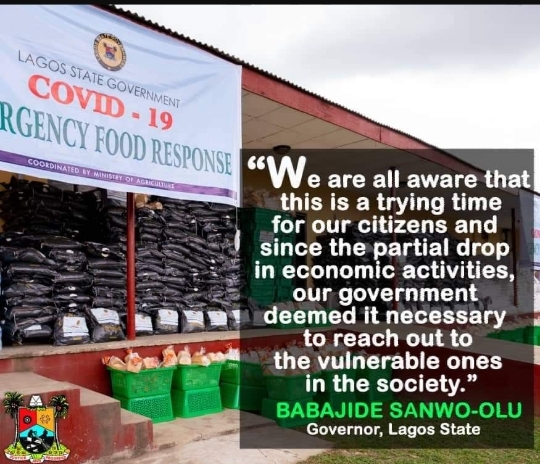Armed with a N10 billion intervention fund from the presidency, Governor Jide Sanwo-Olu has just introduced a free feeding program for the poorest and most vulnerable in Lagos.

And that really appears most sensible measure any serious government would be excited to implement in the face of uncertainties spawned by COVID-19.
But without any sense of exaggerated sarcasm, one would suggest that Mr. Sanwo-Olu also empower independent monitors to track transparency in the distribution chain.
It is not an exaggeration to note that public officials at any level are susceptible to abuse of power, among other unwholesome practices. And chances are that this vice may hobble distribution of the dry food items. It is rather too late to start screaming collaborative sabotage already, but it is not too early either to note that some of the food items might eventually end up in the stalls of some food vendors, ready to make a kill from the diverted package.
With persons living with disabilities and the elderly as potential beneficiaries of the stimulus package, the fear of abuse and deprivation is more than ever real. Especially if Mr. Sanwo-Olu fails to accommodate the participation of Disabled Persons Organizations and Civil Society Organizations in monitoring the distribution at the local councils.
In fact, it will not be a bad idea if disabled persons clusters are allowed to distribute the food stuffs to their members in collaboration with the Lagos State Office for Disability Affairs. This is even more apt since each of the clusters have a register of their bonafide members.
Same method can also be applied to protect old beneficiaries. In this case, Community-Based Organizations with thematic focus on the elderly may serve as monitors here.
The media, too, have a huge role to play here. In ensuring that the distribution process is devoid of opacity and the shenanigans that may eventually expose the vulnerable beneficiaries to avoidable torments.
As an aside, the use of social registers in implementing distribution of the stimulus package to the 200,000 households in the state is not entirely bad. But one is curious to know what register Mr. Sanwo-Olu was referring to in his address. How long have those registers existed, and when last were they updated to capture more relevant data? In serious societies where data gathering guides planning and development interventions, one may not need to ask these questions at all. But here, Lagosians are grumbling already that party affiliation and party registers at ward levels may suddenly shoot up and become a factor in the distribution permutation.
The skepticism is not exactly baseless. But Mr. Sanwo-Olu can prove the pessimists wrong for the first time with this experiment.


